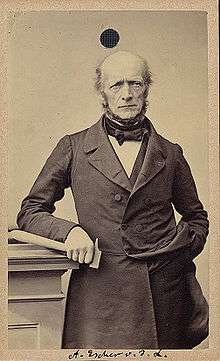Arnold Escher von der Linth

Arnold Escher von der Linth (8 June 1807 in Zürich – 12 July 1872) was a Swiss geologist, the son of Hans Conrad Escher von der Linth (1767-1823).
He made the first ascent of the Lauteraarhorn on 8 August 1842 together with Pierre Jean Édouard Desor and Christian Girard, and guides Melchior Bannholzer and Jakob Leuthold.[1]
He studied geology and other sciences in Geneva, where one of his teachers was Nicolas Theodore de Saussure, and in Berlin as a student of Leopold von Buch and Alexander von Humboldt. In 1856 he became professor of geology at the École Polytechnique in Zürich and established the Geological Institute there.[2] His researches led him to be regarded as one of the founders of Swiss geology.
With Bernhard Studer, he was the first to systematically explore the geology of the Swiss Alps and its neighboring regions (eastern Switzerland, Vorarlberg, Tyrol, Piedmont and Lombardy).[2] Also with Studer, he produced a highly acclaimed geological map of Switzerland (1853).[3]
In particular, his scientific liaison with the Scottish geologist Roderick Murchison (1792-1871) made him a contributor to the discovery of the Silurian system, and the first systematic description of sedimentary rocks and their index fossils.[4]
He was the author of Geologische Bemerkungen über dos nordliche Vorarlberg und einige angrenzenden Gegenden (Geological observations on the northern Vorarlberg and some adjacent areas), published at Zürich in 1853.[3]
References
- ↑ The Alpine Journal, Volume 17 by Sir Leslie Stephen, Douglas William Freshfield, Sir William Martin Conway, Arthur John Butler, George Yeld
- 1 2 Dictionnaire historique de la Suisse (biography)
- 1 2 ADB:Escher, Arnold at Allgemeine Deutsche Biographie
- ↑ Roderick Impey Murchison (1792-1871) an Arnold Escher von der Linth (1807-1872) (in French) e-manuscripta. ETH Bibliothek Zürich. Retrieved 15 January 2014.
 This article incorporates text from a publication now in the public domain: Chisholm, Hugh, ed. (1911). "article name needed". Encyclopædia Britannica (11th ed.). Cambridge University Press.
This article incorporates text from a publication now in the public domain: Chisholm, Hugh, ed. (1911). "article name needed". Encyclopædia Britannica (11th ed.). Cambridge University Press.